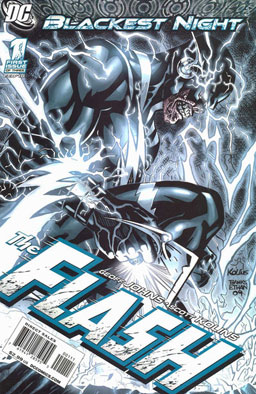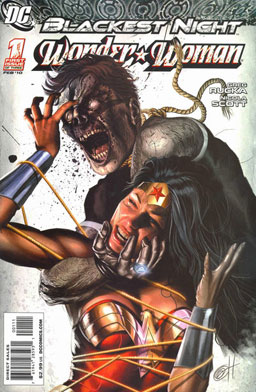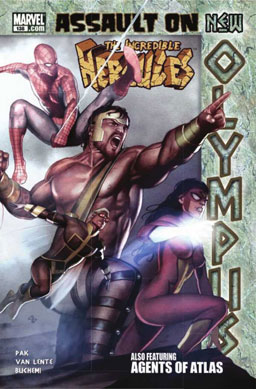Death Race 2009

Blackest Night: The Flash #1
The ever-expanding “Blackest Night” crossover moves into a three-issue miniseries starring Barry Allen, the Silver-Age Flash. He’s warning as many heroes as he can about the dangers of the Black Lanterns and how they can be stopped — he’s even making sure some of his enemies know — namely, the mostly honorable Rogues, Captain Cold, Heat Wave, Mirror Master, Weather Wizard, the new Trickster. And it looks like all of them will have to pitch in — many of the zombified Black Lanterns are former Rogues who are probably going to be going after their former friends. While Tar Pit and the new Captain Boomerang wait for the arrival of the original deceased Captain Boomerang (the old one was the new one’s father), Barry tangles briefly with the zombified Professor Zoom, the Reverse-Flash, then heads to Gorilla City to get advice from his old friend Solovar, the ruler of Gorilla City. Unfortunately, Barry doesn’t know that Solovar died years ago, and Barry has to fight an undead psychic gorilla who keeps trying to convince him that he’s not all bad. Meanwhile, the Rogues are preparing to take the fight directly to their Black Lantern counterparts with a raid on their new hideout in Iron Heights Prison.
Verdict: Thumbs up. A big part of the reason I enjoyed this is the artwork — Scott Kolins was one of my favorite artists during the Wally West glory days of “The Flash, with a gritty style that perfectly suited the more blue-collar vision of Flash, the Rogues, and Central/Keystone City of the early 2000s. To be honest, I’m looking forward to this miniseries more for the Rogues than for Barry — Wally West was the Flash I knew and cared about, but the Rogues are classics, and anything that shines a good bright spotlight on them is great with me.

Blackest Night: Wonder Woman #1
And another new “Blackest Night” crossover, as Wonder Woman goes to Washington, DC, to confront Black Lantern Maxwell Lord, the former ally turned enemy who Wondy killed a few years back. She finds him in Arlington National Cemetery, where he’s using his psychic powers to hold hostage the guards of the Tomb of the Unknowns. She isn’t having much difficulty with Max until his reinforcements arrive — enough Black Lantern rings to zombify everyone buried in the cemetery, including a few members of the WWII Blackhawk Squadron and DC’s original Unknown Soldier. How does she deal with several thousand zombies? She makes her magic lasso emit pure, blinding light and incinerates all of them.
Verdict: Man, I don’t know. I absolutely love Nicola Scott’s always outstanding artwork, but I got some serious squick going on with the idea of desecrating every body in Arlington National Cemetery and cremating them all down into random piles of ash. No, not even if it’s just fictional. “Hey, families of American soldiers! Wonder Woman just torched your grampa’s dead body! Wheee!” I know, I know, probably getting carried away, but that was my reaction when I first read it, and I don’t feel a lot better about it yet.

The Incredible Hercules #138
Hercules, Amadeus Cho, a few renegade Greek gods, and the Avengers need to storm a skyscraper housing the Olympus Group, where the rest of the Greek gods are holed up while Hera prepares to unleash her “Continuum” plan that will eliminate human life from Earth. With so many gods watching over the building, a frontal assault can’t succeed, but a little cleverness and misdirection gets everyone in the front door and ready to fight. But can anyone survive when the God of Death makes his appearance? And in a backup story starring the Agents of Atlas, Venus is freed from her hypnotic spell, depriving the monster Phorcys of the legions of mortals he was about to eat. He retreats to the sea, and the Agents prepare to make their own assault on the Olympus Group.
Verdict: Thumbs up. What I’m enjoying the most about this story is the characterization. Hercules, Amadeus, Zeus, Hebe, and Spider-Man are all excellently represented here, but the real standout star as a character is, of all people, USAgent, who comes across as a cross between a monotheist and an atheist by insisting that Hercules, Zeus, and the rest are merely garden-variety metahumans who’ve convinced themselves that they’re actual gods — and he’s actually allowed to make a good case of it, too. Definitely not the standard treatment for comic-book skeptics, who are usually not much more than comic relief.
